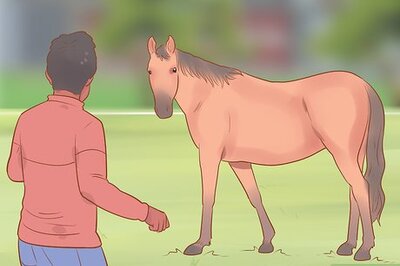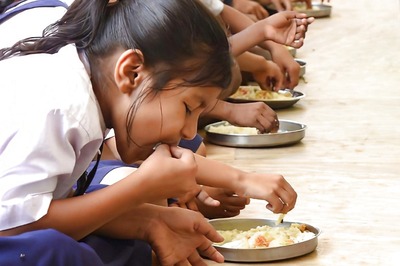
views
Near Baghouz (Syria): US-backed fighters have been hoping for weeks that the final day has come for the Islamic State group's "caliphate", but its last tiny sliver of land just won't seem to empty.
Tens of thousands of dust-covered women, children and men have streamed out of the ragged tent encampment in the Syrian village of Baghouz since December — and despite that exodus they still keep on coming.
The numbers have flummoxed the Kurdish-led forces and bogged down their offensive to finish off the once sprawling proto-state.
"When we began the operation we knew there would be civilians, but not in such a big number," Adnan Afrin, a spokesman for the Syrian Democratic Forces, said Thursday.
In recent days thousands more men and women — including those who once flocked to join IS from across the globe — left the IS pocket.
That upended assumptions that few families remained holed up in Baghouz and those who refused to leave or surrender were choosing to die there.
"They're coming from underground... they're never-ending," said one SDF official.
The International Rescue Committee on Friday said as many as 12,000 people from Baghouz have arrived in one camp for non-combatants in northeast Syria over the past 48 hours, including some 6,000 people on Thursday alone.
The women trucked out of the bastion this week gave drastically varying figures on the holdout families that remain in the bombed-out and besieged jihadist bastion.
"There's still more," said Umm Aboud from the northern Syrian city of Al-Bab.
"You see how many people have come out in the past few days, there's that many still inside," said the mother of four, her bright green eyes peering through a black veil.
More than 55,000 civilians have arrived in the Kurdish-run Al-Hol camp since December, according to the International Rescue Committee.
"The IRC and other agencies are doing all they can do help the new arrivals but Al-Hol camp is now at breaking point," the organisation said Friday.
"No one could have guessed that such a large number of women and children were still living in Baghouz."
Questions remain as to how aid planners, as well as SDF officials and their coalition partners, could have so severely underestimated the number of people left in the crumbling "caliphate".
Carrying what they could manage, black-clad women trucked out of Baghouz in the past few days have said they were living crammed together in trenches, tents and cars near the bend in the Euphrates as the bombing campaign rolled the redoubt back.
"There are thousands of families leaving... (but) there were thousands and thousands of families there, even I was surprised," 35-year-old Umm Alaa, from the Iraqi town of Heet, said Wednesday after fleeing.
The mother of 10 said she lost a child last week due to hunger as the situation grew increasingly desperate.
Footage obtained by AFP from the Free Burma Rangers, a Christian aid group run by a former US special forces operative, showed hundreds of people still remained in the riverside camp.
In the images said to have been filmed Thursday, women draped in black walked through the makeshift dwellings as overturned cars and scraps of twisted metal littered the ground.
The aid group has come in close proximity to the camp in recent days and its head, David Eubank, told AFP some two thousand people could remain inside.
Analyst Mutlu Civiroglu, on the ground in eastern Syria, told AFP that IS was purposefully trying to conceal its numbers.
They have regularly been "releasing certain numbers of people, including fighters, in controlled amounts" in an attempt to buy time, he said.
"If they really wanted to surrender, they would have... and if they wanted to fight again, they could have," he added.
The delay was "a deliberate effort, maybe to prepare for something else... what that is though is unclear".




















Comments
0 comment